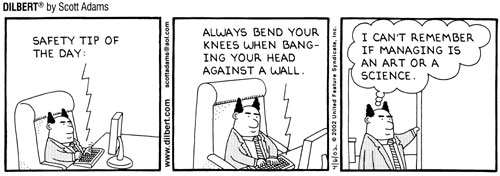Too close for comfort
All managers want to see employees interact and gain a sense of camaraderie. However, if employees become too close, it can result in decreased productivity, which is bad for business. If you've noticed poor performers are well-liked by other employees, top performers are discouraged from outperforming others, leaders and others are treated as outsiders, and employees perform poorly when you're not around, you may have a set of employees that has become too cliquish.
To help poorly performing employees place more emphasis on production, try introducing some competition. Offer individual performance rewards, or separate employees into groups and have them compete against each other. If you must discipline an employee, keep the conversation private. Public discipline will make an employee a martyr among his peers and create more cohesiveness against you. You also should consider removing troublemakers from a department and placing them with a different group.
Source: Adapted from Getting Things Done Without Getting Done In, as cited in Team Management Briefings, January issue.
Improve your company's image
Nothing matters more when attracting new customers than the perception potential customers have about your company. The impression you make influences peoples' opinions about your company. Try the following tips to help you make a good impression with potential customers:
Network. When attending events, introduce yourself to people. Create a simple introduction that includes your company name and title. Also, ask acquaintances questions about their businesses. Acquaintances will be more likely to remember you if you're interested in them.
Have pride. When meeting potential customers, it's not necessary to brag about your company's accomplishments, but it is important to be enthusiastic and proud of your work. You also should motivate your staff to be effective public-relations representatives. If your employees are happy at your company, they will portray that to others.
Continue your education. Sign up for classes and seminars and receive certifications to ensure you are aware of new techniques and programs. The more effort you put into making your company succeed, the better others' opinions will be.
Source: Adapted from 4 questions to help you boost your company image, as cited by The Motivational Manager, March issue.
Avoid airport delays
Since Sept. 11, 2001, airports continually have been upgrading security. The passage of the Aviation and Transportation Security Act and switch to government-employed screeners has made time spent in an airport lengthier, which can make short trips hectic. Consider the following guidelines to make passing through security easier:
Source: Adapted from Entrepreneur, as cited by First Draft, March issue.
UL teams up with Disney
In February, Underwriters Laboratories (UL) Inc., a Northbrook, Ill.-based product-safety testing organization, opened an interactive exhibit at Walt Disney World® Epcot,® Orlando, Fla. Test the Limits Lab, a 3,000-square-foot (279-m²) exhibit, is the latest feature added to Epcot's Innoventions attraction in the Discovery section of its theme park.
The exhibit features five activities that allow visitors to test products through hands-on experience, similar to product-safety testing conducted by UL engineers. The activities are conducted by trained Innoventions staff members and include simulated safety testing, such as swinging a steel ball at a television tube to test its ability to withstand implosion and dropping a 50-gallon (189-L) barrel on a firefighter's helmet to test its impact resistance.
"UL tests more than 18,000 types of products each year to make sure they won't hurt the people who use them or damage their property," says Barbara Guthrie, UL's director of consumer affairs. "The Test the Limits Lab allows guests to become ‘honorary' UL engineers as they test products just like UL does every day."

COMMENTS
Be the first to comment. Please log in to leave a comment.